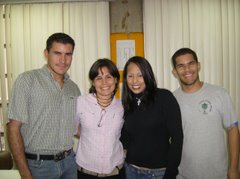
This word comes from the Latin “discupulus” that means “student” and is directly referred to the way teachers treat students. After 1960, British and American research showed that mistreating student –as it was formerly practised– did not contribute, at all, with students’ learning. However, teachers must be ready to deal with problem behaviour and keep discipline in the classroom. Three different approaches are found then:
I. Knowing the reasons for such conduct, that is, why it occurs.
This is the stem of the behavioural problem and probably the most important aspect to consider, since it may counter the behaviour from the very beginning. Some of the factors that allow for the appearance of problem behaviour are:
Family
Education
Self-esteem
Boredom
External factors
Teacher’s behaviour.
II. How to prevent problem behaviour.
Prevention is always better than the discipline cure. Some actions that a teacher might take are:
- To create a code of conduct where students participate in conforming the rules that everyone agrees to follow.
- To keep his/her and his/her students’ interest and enthusiasm, professionalism, and rapport when performing classroom activities, since a busy and interested student, that considers him/herself responsible of his own learning process is less likely to display problem behaviour.
III. The third approach is the reaction to the problem behaviour that already arose, which some teacher may not know how to handle. Some guidelines are:
- Act immediately. The longer the behaviour remains unchecked, the worse and the more difficult to solve it gets.
- Focus on the behaviour not the pupil. Remember that it is the behaviour that matters and you do not need to humiliate student to make that clear.
- Keep calm and take things forward. The objective is to continue in order to get to another stage in which the conduct disappears.
- Reprimand in private. The student in question will be more likely to admit his behaviour if he is in a confident environment and if he is in a classroom with 30 of his/her classmates.
- Use colleagues and the institution. The teacher may find people with more experience that might have dealt with those matters before and their knowledge would probably be exactly what the teacher needs.
I. Knowing the reasons for such conduct, that is, why it occurs.
This is the stem of the behavioural problem and probably the most important aspect to consider, since it may counter the behaviour from the very beginning. Some of the factors that allow for the appearance of problem behaviour are:
Family
Education
Self-esteem
Boredom
External factors
Teacher’s behaviour.
II. How to prevent problem behaviour.
Prevention is always better than the discipline cure. Some actions that a teacher might take are:
- To create a code of conduct where students participate in conforming the rules that everyone agrees to follow.
- To keep his/her and his/her students’ interest and enthusiasm, professionalism, and rapport when performing classroom activities, since a busy and interested student, that considers him/herself responsible of his own learning process is less likely to display problem behaviour.
III. The third approach is the reaction to the problem behaviour that already arose, which some teacher may not know how to handle. Some guidelines are:
- Act immediately. The longer the behaviour remains unchecked, the worse and the more difficult to solve it gets.
- Focus on the behaviour not the pupil. Remember that it is the behaviour that matters and you do not need to humiliate student to make that clear.
- Keep calm and take things forward. The objective is to continue in order to get to another stage in which the conduct disappears.
- Reprimand in private. The student in question will be more likely to admit his behaviour if he is in a confident environment and if he is in a classroom with 30 of his/her classmates.
- Use colleagues and the institution. The teacher may find people with more experience that might have dealt with those matters before and their knowledge would probably be exactly what the teacher needs.


